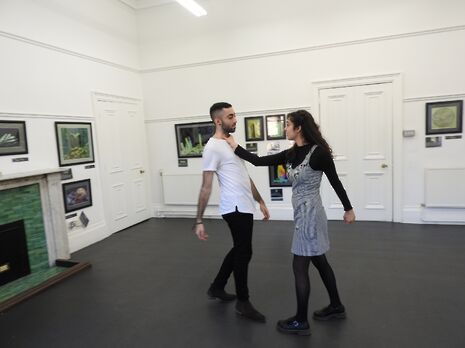Taming of the Shrew preview: ‘intimate and interactive’
This all-BME production challenges the misogyny of Shakespeare’s original script in style

The perpetual question that’s asked about modern Shakespeare productions, and will be asked of the new production of The Taming of the Shrew (directed by Denicia Bernard and Sara Hazemi), is how they are made relevant to an audience who are not only 400 years distant from the author but who have probably also experienced the play before. Some defend Shakespeare’s relevance calling him ‘timeless’ and say that he is a playwright with the power to depict the entirety of the ‘human condition’. The directors of this upcoming production of one of Shakespeare’s most contentious plays felt that Shakespeare needed to be made relevant. Unsurprisingly, this is what their production aims to do.
Bernard and Hazemi’s production is built around the diverse backgrounds of its entirely BME cast and crew. Working in collaboration with the actors to bring in elements of their personal experiences growing up in BME households, the production aims to create a space for the celebration of these diverse cultures. The two wedding scenes in The Taming of the Shrew are as far removed from the white veils and Wedding March which dominate Anglican marriage ceremonies as it is possible to get. Instead, this production is envisaged as a place to share aspects of Indian, Malaysian, Sierra Leonean and Singaporean culture that the cast have brought to this intensely collaborative production. The music that underscores many of the scenes in the play was chosen by individual cast members, and the costumes of the production feature items from their different heritages.
Speaking of the problems involved in performing a play which seems to promote the patriarchal domination of women, Bernard emphasised the importance of not shying away from the issues of the play. She points out that the main problem for a post-feminist audience is the ‘taming’ of Kate, Petruchio’s wife (played by Priya Edwards), and her ultimate subservience to her husband’s (played by Danny Baalbaki) authority. Bernard, however, has restructured and revised the play in order to subvert the original gender dynamics.
But not all the problematic issues of the original Shakespeare have been revised. The production team are keen not to brush issues under the carpet, but rather highlight some of the problems, and implicate the audience in their resolution. This is partly achieved though the use of a traverse stage format, bringing the audience as close as possible to the events of the play. The audience are further implicated by their becoming a kind of prop table throughout the performance, drawn upon and used by the actors. The audience are also the attendees of the two weddings that occur in the play.
With such an intimate and interactive setting, in which the audience are mixed in with the performers yet cannot prevent their actions, this production encourages the audience to leave the theatre questioning their own involvement in the creation of contemporary gender structures. Talking to the both directors it is clear that Cambridge theatre doesn’t get much more passionate or more relevant than this.
The Taming of the Shrew is on at the Fitzpatrick Hall, 26-27 February
 Features / Should I stay or should I go? Cambridge students and alumni reflect on how their memories stay with them15 December 2025
Features / Should I stay or should I go? Cambridge students and alumni reflect on how their memories stay with them15 December 2025 News / Dons warn PM about Vet School closure16 December 2025
News / Dons warn PM about Vet School closure16 December 2025 News / Cambridge study finds students learn better with notes than AI13 December 2025
News / Cambridge study finds students learn better with notes than AI13 December 2025 News / SU reluctantly registers controversial women’s soc18 December 2025
News / SU reluctantly registers controversial women’s soc18 December 2025 News / News In Brief: Michaelmas marriages, monogamous mammals, and messaging manipulation15 December 2025
News / News In Brief: Michaelmas marriages, monogamous mammals, and messaging manipulation15 December 2025








